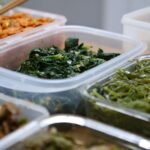Meal prepping is a game-changer for anyone looking to save time, eat healthily, and reduce food waste. In today’s fast-paced world, spending hours in the kitchen daily is impractical for many. By adopting smart meal prep hacks, you can streamline your cooking process and better use your ingredients.
Reducing food waste is not just good for your wallet but also for the environment. By planning and preparing your meals ahead of time, you can avoid the common pitfalls that lead to throwing away unused food. Efficient meal prep also means you can enjoy nutritious, home-cooked meals without the stress of daily cooking.
In this article, we’ll explore various meal prep hacks that will help you save time and reduce food waste. From planning and shopping to storage and cooking, these tips will revolutionize your approach to meal preparation.
Plan Your Meals
The first step in efficient meal prepping is planning your meals. Take some time each week to decide what you’ll eat for breakfast, lunch, and dinner. This approach ensures you use your ingredients effectively and avoid last-minute takeaway orders.
Create a meal plan that incorporates a variety of foods to keep your diet balanced. Include proteins, vegetables, grains, and healthy fats. Planning your meals also helps in making a precise shopping list, which brings us to the next point.
Make a Detailed Shopping List
A detailed shopping list is essential for efficient meal prepping. Write down everything you need for the week based on your meal plan. Stick to the list when you shop to avoid buying unnecessary items that might go to waste.
Check your pantry, fridge, and freezer before heading to the store. Use up items you already have to avoid duplicating ingredients. This habit reduces food waste and saves you money.

Batch Cooking
Batch cooking is a great way to save time during the week. Cook large quantities of staple foods like grains, beans, and proteins. Divide them into portions and store them in the fridge or freezer for quick and easy meals.
For example, cook a big pot of rice or quinoa and use it in different dishes throughout the week. Roast a batch of vegetables that can be added to salads, and sandwiches, or eaten as a side dish. Batch cooking ensures you always have cooked food on hand, reducing the temptation to order takeaway.
Use Versatile Ingredients
Choose ingredients that can be used in multiple recipes. This strategy minimizes the number of different items you need to buy and ensures nothing goes to waste. For example, a large bag of spinach can be used in salads, smoothies, and cooked dishes.
Versatile ingredients like chicken, eggs, and tomatoes can be transformed into a variety of meals. Plan your recipes around these flexible foods to maximize their use.
Proper Storage Techniques
Proper storage is crucial for maintaining the freshness of your prepped meals. Invest in high-quality, airtight containers that can keep your food fresh for longer. Label your containers with the contents and date to keep track of what needs to be eaten first.
Store your prepped meals in the fridge if you plan to eat them within a few days. For longer storage, use the freezer. Make sure to cool food completely before freezing to prevent ice crystals from forming, which can affect texture and taste.

Utilise Leftovers
Leftovers are a valuable part of meal prepping. Instead of discarding them, find creative ways to incorporate them into new meals. Leftover roasted vegetables can be added to a frittata, and cooked chicken can be used in salads or wraps.
By reusing leftovers, you reduce food waste and save time on cooking. It also adds variety to your meals without extra effort.
Cook Once, Eat Twice
A smart meal prep hack is to cook enough for two meals at a time. For example, make a large dinner and save half for lunch the next day. This method ensures you always have a ready meal without additional cooking.
This strategy is particularly useful for busy weekdays. It reduces the time spent in the kitchen and keeps your diet on track, even when you have little time to cook.
Freeze Portions
Freezing is an excellent way to preserve meals and ingredients. Portion out meals and freeze them for future use. This hack is especially useful for perishable items that you can’t consume immediately.
When freezing meals, use airtight containers or freezer bags to prevent freezer burn. Label each item with the date and contents to keep your freezer organized. Frozen meals can be a lifesaver on days when you don’t have time to cook from scratch.
Repurpose Ingredients
Repurposing ingredients is another way to reduce food waste. If you have extra vegetables, turn them into a soup or stir-fry. Leftover herbs can be blended into a pesto or frozen in ice cube trays for future use.
Think creatively about how to use ingredients before they go bad. This habit not only reduces waste but also adds variety to your meals.
Use Seasonal Produce
Buying seasonal produce is beneficial for both your wallet and the environment. Seasonal fruits and vegetables are often cheaper and fresher. They also reduce the carbon footprint associated with transporting out-of-season produce.
Plan your meals around what’s in season. Not only will your meals taste better, but you’ll also be supporting local farmers and reducing food miles.

Organise Your Kitchen
An organised kitchen makes meal prep more efficient. Keep your pantry, fridge, and freezer tidy and clutter-free. Group similar items together and use clear containers for easy visibility.
Having a well-organised kitchen means you can quickly find what you need, reducing the time spent searching for ingredients. It also helps you keep track of what you have, preventing unnecessary purchases and waste.
Prep in Stages
If the idea of prepping all your meals at once feels overwhelming, try prepping in stages. Start with chopping vegetables one day, cooking proteins the next, and assembling meals later. This approach breaks down the process into manageable steps.
Prepping in stages can be less time-consuming and less tiring. It also allows you to focus on one task at a time, improving the quality of your prep work.
Invest in Quality Containers
Investing in quality containers is essential for meal prep. Look for containers that are durable, airtight, and microwave-safe. Glass containers are a great option as they are non-toxic and can go from the fridge to the microwave easily.
Having the right containers makes storing and reheating your meals more convenient. It also ensures your food stays fresh for longer, reducing waste.
Rotate Your Stock
Regularly rotate the stock in your pantry, fridge, and freezer. Use older items first to prevent them from spoiling. When you buy new items, place them behind the older ones.
Rotating your stock ensures you use up everything before it goes bad. It also helps you keep track of what you have, preventing duplicate purchases.
Meal Prep with Friends or Family
Meal prepping doesn’t have to be a solo activity. Invite friends or family to join you. Not only does this make the process more enjoyable, but it also allows you to share tips and recipes.
Prepping with others can make the task feel less like a chore. It’s also a great way to bond and share the workload, making meal prep more efficient.

Utilise Technology
Use technology to streamline your meal prep process. There are many apps available that can help you plan meals, create shopping lists, and even track your pantry inventory.
Technology can save you time and make the planning process easier. Some apps even offer recipe suggestions based on the ingredients you have, helping you use up what you have and reduce waste.
Conclusion
Meal prepping is an effective way to save time and reduce food waste. By planning your meals, making detailed shopping lists, and using proper storage techniques, you can streamline your cooking process and make the most of your ingredients. Incorporating these meal prep hacks into your routine will not only benefit your schedule and wallet but also contribute to a more sustainable lifestyle.
Remember, the key to successful meal prep is consistency. Start with small steps and gradually incorporate more hacks into your routine. Over time, you’ll find meal prepping becomes second nature, and you’ll enjoy the benefits of a more organised, efficient, and waste-free kitchen.





